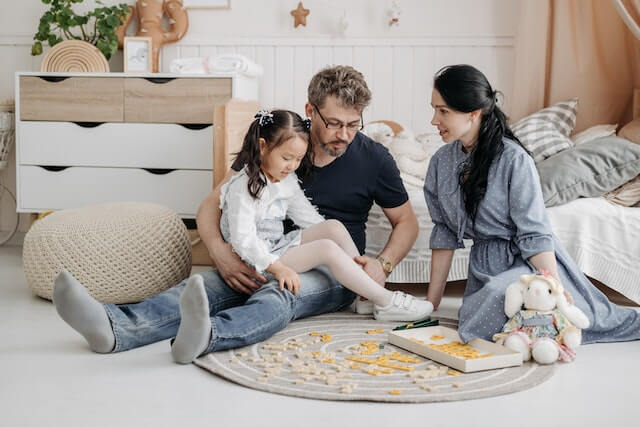Article by: Steffanie Strawbridge, LCSW-S
November is National Adoption Month! Adopting is the act of giving a child a forever home and a family. Many people choose this path to adding to their family. It may be due to fertility issues, it may be that your heart has called you to take in a child in need, or a million other reasons. Whatever the reason, adoption can be a fulfilling way of adding to your family. However, no matter when you adopt a child, from infancy or when they are older, you may face unexpected challenges. Parents and other adults benefit from proactively preparing for the adoption process, including learning about common myths.
Myth 1:
A child adopted as an infant will not feel abandoned.
Fact:
No matter the age of the adopted child, at some point, they likely will feel abandoned and unwanted. This is not a reflection of the adopted parent’s ability to parent; the child may feel that to be adopted means their bio parents rejected them. No matter how much the adopted parent(s) share how much the birth parent loved them, feelings of abandonment from the bio family may arise.
Help for Parents:
Depending on how open your adoption is will depend on the options you have to support your child. Ultimately, assuring your child that you love them will, over time, help them deal with the feelings of abandonment. If you have an open adoption with regular contact with birth parent(s), asking them to have a conversation with the child about the reason they chose you as their child’s parent(s) can help the child have a better understanding of the situation and their place in everyone’s life. If your adoption does not have regular contact with the birth parent(s), then telling your child what you know about the situation that led to their adoption will help them process and find closure.
Myth 2:
We should not tell the child they are adopted until they are 18.
Fact:
Children often benefit from knowing their adoption history from the beginning of the process. Families that choose to delay the news until the child is older often have to deal with the child feeling lied to and having their trust in their parents broken. Adopted parents can explain to children they CHOSE them. For many people, the fact that they were chosen can lead to a sense of better connection and trust.
Help for Parents:
Be honest with your child(ren) in an age-appropriate way. Tell them their adoption story as often as you can! Their adoption story should include how you decided to adopt, what made you choose them, and what you know (that is positive) about their birth parent(s). The story should also contain statements about how glad you are that they are your child and how precious they are as a person. The need to be open and honest is especially true for kinship adoptions. When adoption happens between family members, the information may be disclosed to the child who might harbor emotions toward the family for keeping information from them.
There are many amazing books out there that help parents talk to their child about adoption!
Some recommended books:
For Parents:
- The Connected Child by Karyn Purvis and David Cross
- Twenty Things that Adopted Kids Wish Their Adopted Parents Knew by Sherry Eldridge
- The Open Adoption Experience- A Complete Guide for Adoptive and Birth Families by Lori Ruskai Melina
For Young Kids:
- We Belong Together and The Family Book by Todd Parr
- And Tango Makes Three by Justin Richardson and Peter Parnell
- I’ve Loved You Since Forever by Hoda Kotb
- The Best Family in the World by Susana Lopez Rubio
- Tell Me Again About the Night I Was Born by Jamie Lee Curtis
For Older Kids:
- Half A World Away by Cynthia Kadohata
- The Misadventures of the Family Fletcher by Dana Alison Levy
- Adopted Teens Only- A Survival Guide to Adolescents by Dabea Gorbbett
Myth 3:
You should adopt children only who share your culture and ethnicity.
Fact:
While culture is important and something that families who adopt a child that is of a different culture than them should acknowledge and embrace, having unconditional love and support is truly important.
Help for parents:
Adoptive parents are encouraged to help their child explore and learn about their birth culture and, when possible, to find caring adults that share a similar culture with the child. As an adoptive parent, you will benefit from learning your child’s cultural history as well! Explore your city’s cultural festivals and read books/watch movies with main characters that look like your child. Also, parents do not have to know all the answers about growing up as a child of a different culture. Acknowledge you hear your child’s thoughts and concerns. Talk about ways you can find out answers to their questions or concerns.
Myth 4:
Open adoptions are confusing for a child.
Fact:
Open adoptions can be very healthy and helpful for a child. When the birth parents are safe and healthy, a relationship with them can allow your child to understand their genetic family history as well as their culture. When no connection is kept with biological parents, your child may seek contact with the bio parents upon turning 18 years old.
Help for parents:
Open adoption can vary from family to family! Some open adoptions exchange letters and pictures once a year through their adoption agency. Some have periodic phone calls or meetings. Some even include such regular contact that the child considers their birth parent an “aunt” or “uncle”. When choosing the type of open adoption, consider what your agency recommends and what you feel comfortable maintaining until your child is at least 18 years old. For families who adopt from foster care or internationally, having open adoptions is often not an option. It is helpful if you can gather as much information as you can about the birth parents. If pictures are available, then requesting copies that you can share when appropriate might be helpful. Gathering this information empowers you to answer your child’s questions as they grow. It also allows older children to feel like it is safe for them to talk about their previous family situations and that you are willing to listen.
Myths 5 and 6
Children will want to go back to their birth family.
Adopted children are too emotionally damaged to fit into a family.
Fact:
This myth is often believed by families who adopt older children, normally out of foster care or
international adoption. The child likely does not want to go back to their birth family as much as they do not know how to survive and thrive in a new family. Their survival skills are well honed from the family situations they have previously lived and may look like behavioral problems now. This applies to being “too emotionally damaged” to fit into a family as well. They are not “damaged”; they have learned a set of skills that, while may be unhealthy and maladaptive in their new family environment, help them survive their past.
When adopting children from orphanages and foster homes, parents will need patience, consistency, and a willingness to walk through potentially complex emotions with their child. Professional help in the form of a counselor who specializes in working with adopted children can help your child have a neutral person to listen and help develop new skills. The professional can also guide parents in new ways of handling situations as they come up. Professionals trained in programs such as Trust-Based Relational Intervention® and Theraplay® can help build connections between parents and child(ren).

